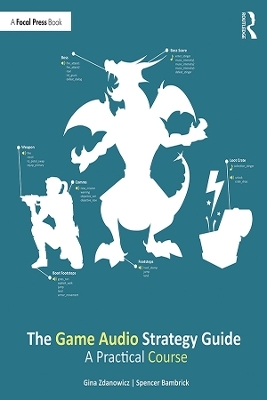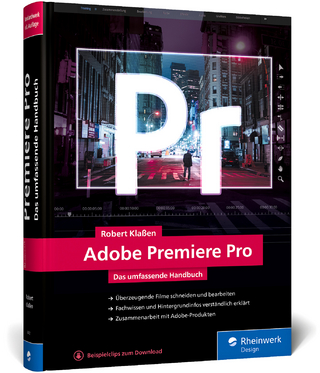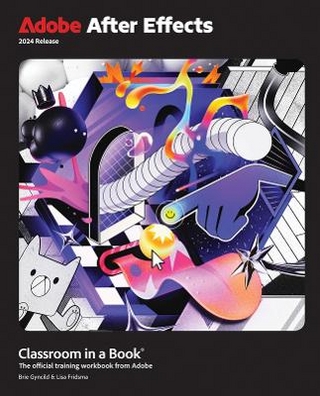
The Game Audio Strategy Guide
CRC Press (Verlag)
978-1-138-49834-1 (ISBN)
The Game Audio Strategy Guide is a comprehensive text designed to turn both novices and experienced audio designers into technical game audio pros. Providing both a theoretical foundation and practical insights, The Game Audio Strategy Guide offers a thorough look at the tools and methods needed to create industry-quality music and sound design for games. The text is supported by an extensive companion website, featuring numerous practical tutorials and exercises, which allows the reader to gain hands-on experience creating and implementing audio assets for games.
The Game Audio Strategy Guide is the essential manual for anyone interested in creating audio for games, inside or outside the classroom.
Gina Zdanowicz is an accomplished audio designer for games, film, TV, new realities, and podcasts. A graduate from Berklee College of Music with a degree in Music Synthesis, Gina honed her skills in game audio by working in house with game developers and founding her own independent sound studio, Serial Lab Sound. Gina has worked on over 100 video game and interactive titles and her work with Nickelodeon (TV) has been nominated for two Daytime Emmy awards. In addition to her career as an audio designer, Gina is a game audio course author and instructor at Berklee Online, a tutor at Thinkspace Education, and a lecturer at universities such as NYU and conferences around the world like GDC. Follow Gina at: www.seriallab.com Spencer Bambrick is a composer for games, film, and the concert stage. His recent work includes BestLuck (2018, PC, Mobile), Block Party (Emmy-Nominated Nick Jr. Series of Animated Shorts), and additional music for Paladins (Hi-Rez Studios). Spencer is the Game Audio Network Guild Northeast Regional Director and he has presented at GameSoundCon (2018, 2017), PAX Dev (2016), and MAGFest (2015). He is currently pursuing his doctorate in Music Composition at The University of Hartford (The Hartt School), studying interactive music, game technology, and social activism.
Foreword
Preface
Acknowledgements
INTRODUCTION
1. Getting Started
Our Goals for this Textbook
Overview and Learning Outcomes
Who Should Read this Book?
How to Use this Book
Requisite Knowledge
Theoretical Framework
Practical Framework, A.K.A. Companion Website (Sound Lab)?
Visiting Artist’s Tips
Key Terms
Further Reading
Game Audio
Game Development Roles Defined
Essential Soft Skills and Tools For Game Audio
Production Cycle and Planning
Research
Making Use of Downtime
PART I
Sound Design
2. The Basics of Nonlinear Sound Design
What is Nonlinear Sound Design?
The Sound Design Process
Challenges in Nonlinear Sound Design
Exploring Immersion and Interactivity
Essential Skills for Sound Designers
3. Designing Sound
Dynamic Audio
Sound Effects
The Function of Sound in Games
Designing the Sonic Palette
Choosing the Right Source for Your Sonic Palette
Sourcing Audio from Libraries
Sourcing Sounds through Synthesis
Sourcing Audio through Studio and Field Recording
Field Recording
Microphone Choice and Placement
Performing Sound with Props
Location Scouting and Preparation
Designing Sound Effects
Sound Design Techniques
Effects Processing as a Sound Design Tool
Putting It All Together
4. Voice Production
Dialogue vs. Voice-Over
PART II
Music
5. The Basics of Nonlinear Music
What is Nonlinear Music?
Challenges of Nonlinear Music Writing
Essential Skills for the Game Composer
Exploring Music as an Immersive Tool
Diegetic vs. Non-Diegetic Music
Production Cycle and Planning
Working with a Team
Platforms and Delivery
6. Composing Music
Generating Musical Ideas and the Creative Cycle
Starting Points for Musical Composition
Composing Game Music
Form and Structure in Game Music
7. Arranging and Orchestration for Games
Genre and Style Considerations
Foundations of Musical Texture in Games
Arranging and Orchestrating Using Samples
Templates
Template Planning
The Orchestral Instruments
Writing for String Samples
Writing for Woodwind and Brass Samples
Writing for Choir Samples
Writing for Percussion Samples
Writing for Full Sampled Orchestra
Advanced Orchestration and Arranging for Live Ensembles
Working with Synthetic Timbres
Other Styles of Arranging in Game Music
PART III
Implementation
8. Audio Implementation
Implementation Basics
Dialogue Systems
Dynamic Mix Systems
Resource Management and Performance Optimization
Testing, Debugging, and QA
9. Music Implementation
Approaching Implementation
Arranging and Orchestration as Implementation
Advanced Vertical Techniques
Advanced Horizontal Techniques
Adding Randomness and Variation
Composing Complex Adaptive Systems Using Middleware
Aesthetic Creativity and Composing Outside the Box
Tools for Experimentation
Pure Data
Simplicity vs. Complexity in Game Music
PART IV
Business and Networking
10. The Business of Games, Part I: What Do We Do Now?
Career Development: Overview and Philosophy
Selecting Tangible Goals
The Pyramid of Sustainability
Career Paths in Game Audio
11. The Business of Games, Part II: Gigs, Gigs, Gigs!
Networking and Creating Value
Demonstrating Value
Finding Work
Business and Price Considerations
The Final Bid
Navigating Contracts
12. Your Game Audio Strategy Guide
Audio Creator as Game Developer
Index
| Erscheinungsdatum | 23.12.2019 |
|---|---|
| Zusatzinfo | 3 Tables, black and white; 18 Line drawings, black and white; 14 Halftones, black and white; 32 Illustrations, black and white |
| Verlagsort | London |
| Sprache | englisch |
| Maße | 191 x 235 mm |
| Gewicht | 1610 g |
| Themenwelt | Kunst / Musik / Theater |
| Informatik ► Grafik / Design ► Film- / Video-Bearbeitung | |
| ISBN-10 | 1-138-49834-3 / 1138498343 |
| ISBN-13 | 978-1-138-49834-1 / 9781138498341 |
| Zustand | Neuware |
| Haben Sie eine Frage zum Produkt? |
aus dem Bereich


